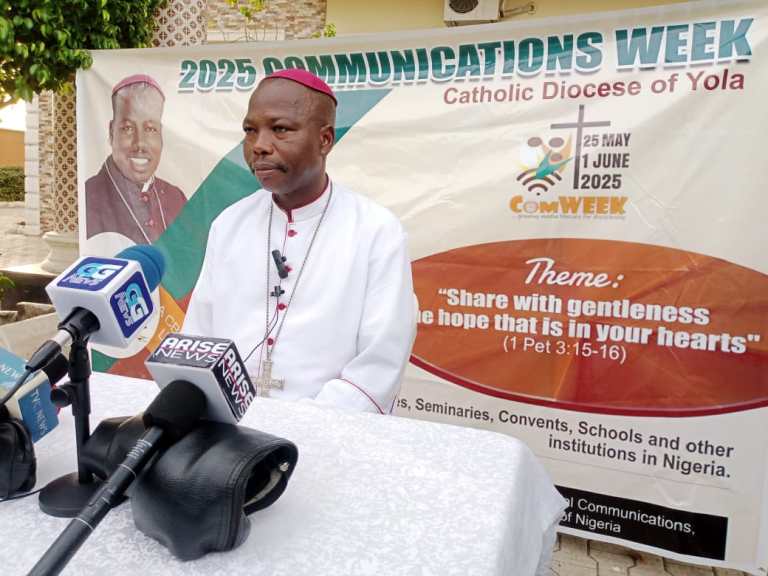From Joseph Asegba, Yola
The Bishop of the Catholic Diocese of Yola, Most Rev. Dr. Stephen Dami Mamza, has urged President Bola Ahmed Tinubu to reconsider any plans by the Federal Government to take on new foreign loans, warning that such a move would further mortgage Nigeria’s future and deepen the country’s economic woes.
Speaking in Yola as part of activities to mark the Catholic Church’s World Communication Sunday, Bishop Mamza expressed concern over Nigeria’s mounting debt profile, describing it as “suffocating.” He cautioned that additional borrowing would only worsen the nation’s already fragile socio-economic conditions.
“We have heard about the billions of dollars the government is planning to borrow again. My appeal to President Tinubu is: don’t borrow money again,” the cleric said.
He emphasized that the Federal Government should instead prioritize transparency and accountability in managing the funds it already has, particularly those recovered by anti-graft agencies such as the Economic and Financial Crimes Commission (EFCC).
“Nigerians want to know the whereabouts of such monies. There must be accountability,” Bishop Mamza insisted.
He stressed that the government’s reliance on external loans, rather than focusing on boosting internal revenue and plugging financial leakages, would be detrimental in the long run.
“What this country needs is not more debt but transparency, effective governance, and economic prudence,” he said.
Bishop Mamza’s comments come at a time of rising inflation, deepening poverty, and widespread insecurity across the country. He noted that many Nigerians have become disillusioned with the system due to poor leadership and unsustainable economic decisions.
This year’s theme for World Communication Sunday, “Sharing with Gentleness the Hope in Your Heart,” he said, is particularly relevant to Nigeria’s current situation.
“This year was declared by the late Pope Francis as the Year of Hope. And in a nation like Nigeria—where so many feel hopeless due to insecurity, poverty, and political instability—the Church is encouraging everyone not to give up,” the Bishop added.
He also called on the media to play a constructive role in nation-building by remaining objective, courageous, and committed to the truth.
“Your work as journalists is both dangerous and sensitive. We always keep you in our prayers,” he said. “But it’s not enough to rely on prayers alone. You must also remain committed to truthful reporting and to facts—without stoking further crisis in our communities.”
Bishop Mamza also revealed that Catholic bishops in Nigeria will meet with the Pope in March 2026 during their Ad Limina visit—a periodic consultation in which bishops from around the world meet with the Holy Father to discuss issues affecting the Church and their dioceses.
He noted that Nigeria is among the first four countries the Pope has approved for this important audience, underscoring the Vatican’s concern about the nation’s challenges.
“Despite everything happening around us, hope must be renewed. Things can change. God is with us—but we must also take responsibility and demand accountability from those who lead us,” he concluded.


